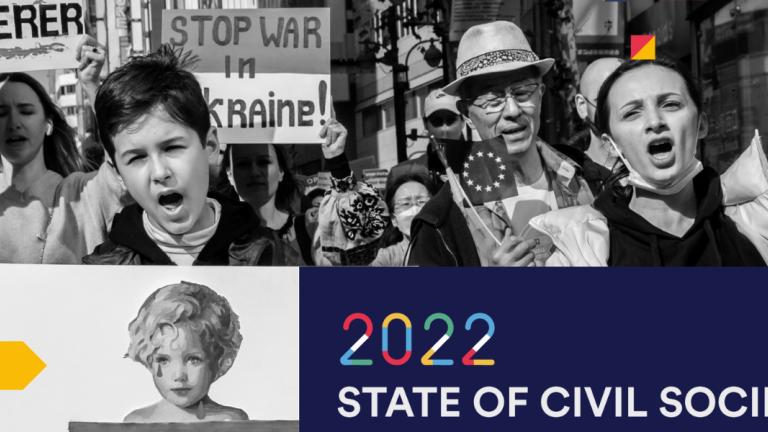
The CIVICUS State of Civil Society Report, published for the 12th time this year, evaluates the past year through civil society actions on different topics ranging from struggles for democracy, inclusion and climate justice to demands for global governance reform.
In the introduction of the report, it is reminded that wars and conflicts continue in different parts of the world, especially in Ukraine, and it is emphasized that civil society plays an important role in responding to conflicts and humanitarian crises. It was stated that the war in Ukraine affects the whole world and has political and economic repercussions at different levels.
Despite the vital importance of civil society, states affected by conflicts and crises often see civil society as a counter-force and therefore take action to suppress civil society, with examples from Ethiopia, Mali and Italy.
The report emphasized that civil society works hard to secure international commitments and human rights norms, monitor states and investigate human rights violations. It was also said that civil society has taken a back seat to the interests of governments and the private sector, and that without the participation of civil society, global governance institutions would fall short of their potential.
The right to protest is under attack around the world
The report said that the Russia-Ukraine war has led to a massive increase in fuel and food prices, triggering a wave of more than 12,000 mass protests in many parts of the world. In 2022, CIVICUS documented protests in at least 133 countries over war-related price hikes.
It was also stated that protests around the world are not only caused by the economic crisis, while state violence against demonstrations and protests has become the norm in many countries.
Governments use a variety of tactics to suppress peaceful protests and use the occasional violent protest as an excuse to curtail all protests.
Democracy continues to erode
It was emphasized that economic insecurity provides fertile ground for the emergence of authoritarian leaders who foster polarization and attack rights, while democracy is also eroded by elected leaders in different ways. The increasing adoption of far-right movements in elections was illustrated with examples from Europe.
"In Italy and Sweden, far-right parties now lead or have a significant influence on governments. France recorded its highest far-right vote ever and anti-immigrant political discourse has been completely normalized. Israel now has the most extreme government in its history."
Misinformation undermines democracy and fuels hatred
Disinformation was also included in the report. Disinformation is said to have played a major role in elections in many countries such as Brazil, the Philippines and South Korea, while misinformation influenced a referendum in Chile that resulted in the rejection of a new progressive constitution.
The report emphasized that disinformation and conspiracy theories on topics ranging from vaccines to climate change, gender and race issues have risen during the pandemic, permeating every aspect of public discourse and normalizing extremist ideas.
Civil society has been the target of disinformation and hate speech, especially when defending the rights of marginalized groups, while disinformation is more prevalent in the areas of women's, LGBTIQ+ and human rights.
While it was said that fact-checking initiatives are only a first step in combating misinformation, it was reminded of the necessity to create a joint and multifaceted global effort against disinformation, developed through participatory processes in the social media and technology industry, with guarantees for freedom of expression.
Civil society continues to move forward in the face of challenging situations
The report also drew attention to the movements in the fields of women and LGBTIQ+ and said that there has been relative progress in these two fields. In 2022, same-sex marriage became a reality in many countries, including Chile and Switzerland. In three Caribbean states, colonial laws criminalizing same-sex relationships were abolished.
Climate struggle is the main force behind civil society
The report said that civil society is fighting back strongly against climate change, pollution and biodiversity loss, encouraging mobilization for action through tactics ranging from street protests to litigation and advocacy in national and global arenas.
It was also said that civil society is working to find new ways to continue to draw public attention to the urgent climate agenda at a time when it is being squeezed by protest restrictions and violence.
It was noted that civil society's energy is keeping the climate emergency high on the agenda and helping to take some steps forward.
"In 2022, the COP27 climate summit finally agreed to begin developing a fund to compensate southern countries for damages and losses caused by climate change, a move that follows years of civil society advocacy. At another major summit, states committed to a new global biodiversity framework to try to protect planetary assets and halt cycles of destruction."
Despite the gains, no concrete action has been taken on fossil fuel use and the political power of the fossil fuel lobby has not diminished.
Civic space fights repression with new tactics
The report said that civic space has grown, diversified and expanded its repertoire of tactics to respond to pressures and challenges. Much of civil society's energy is said to come from outside civil society organizations, with an emphasis on small, informal grassroots groups formed and led by women, youth and indigenous people.
"New forms and practices of civil society have shown admirable resilience. But questions remain about their long-term sustainability. They do not fit neatly into traditional civil society resourcing models, and partners and allies may struggle to find the best ways to support them. The challenge ahead will be to sustain and channel this extraordinary energy to achieve the profound changes that are clearly needed in the world today."
To read the report: https://civicus.org/index.php/state-of-civil-society-report-2023


